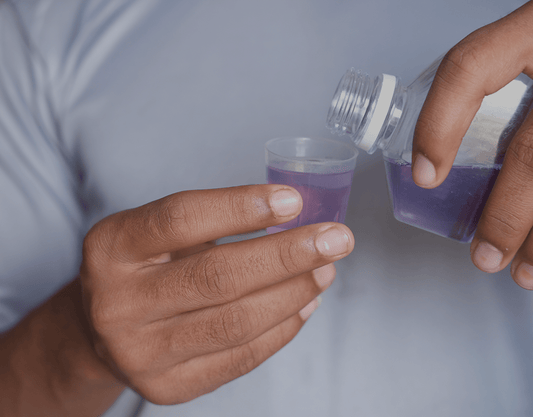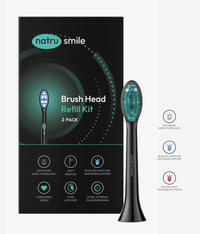
All products are certified by dental expert Dr. Greg Grillo
The clean, fresh feeling after mouthwash is one of the best parts of your oral care routine. But, for some people and some mouthwashes, there's also a burning sensation.
Like alcohol on a cut, you might think the burn means it's working. But does this apply in all situations? Why does your mouthwash burn?
Below, we'll explore the different reasons mouthwash can burn, whether that's normal, and the benefits of using mouthwash.
Is Mouthwash Supposed To Burn?
Generally speaking, mouthwash is supposed to burn and tingle a bit. This comes from one of three ingredients: alcohol, menthol, and chlorhexidine.
You'll find out more about these ingredients in a later section. But this raises the question, what does it mean if your mouthwash burns without these ingredients?
The most common alternative ingredient is hydrogen peroxide. These peroxide-based mouthwashes are great for whitening your teeth. They might also contain various oils (like peppermint oil) that cause burning sensations.
Still, some mouthwashes don't contain these strong ingredients. In these cases, the burning sensation of mouthwashes comes from your sensitivity.
Why Does Alcohol-Based Mouthwash Burn?
Alcohol is the more common component that causes burning. Alcohol is an antiseptic material that is known to kill bacteria. This is why people have used it as medicine since the mid-1300s.
Many types of mouthwash contain alcohol contents of up to 25%, which is more potent than beer. However, you wouldn't use this as medicine, as it has lower alcohol contents than rubbing alcohol and whiskey. So, alcohol becomes more effective at cleaning when it has a higher content.
This is why you also see differences between antiseptic vs. antibacterial mouthwashes. Antibacterial mouthwashes are made for specific bacteria and might be less likely to burn, while the alcohol in antiseptic mouthwashes burns all bacteria.
The too-high alcohol content is unsuitable for cleaning your mouth. This is why you shouldn't put rubbing alcohol in your mouth. Using it as mouthwash isn't recommended and can kill you.
Other Reasons A Mouthwash May Burn
Beyond alcohol, there are a few other reasons why mouthwash might burn. Below, you'll find out more about those reasons.
Allergic Reaction
The least common reason why mouthwash burns is an allergic reaction. However, burning by itself doesn’t mean you are allergic.
You should look for other signs of an allergic reaction, like these below:
- Swelling
- Itching
- Hives
- Difficulty breathing
Those prone to allergic reactions can benefit from an epi-pen. Consult your doctor for more information on how to get one.
This brings us to an important question: what in mouthwash can you be allergic to? You can be allergic to anything, but chlorhexidine and oil are two of the most known.
Chlorhexidine allergies are incredibly rare, but those who have it need to find special mouthwashes. If purchasing mouthwashes without the compound, be sure they are still effective for cleaning.
Alternatively, you might be allergic to peppermint oil. Because menthol is made out of frozen peppermint oil, any mouthwash with menthol might be harmful.
To find out your allergies, request an allergy panel from your doctor. An allergy panel tests you against some more common allergens. In identifying your common allergies, you can eliminate some options.
So, if you think mouthwash is bad for you, it might be because of your allergies. By knowing what you are allergic to, you can better avoid discomfort.
Menthol
Menthol is found in many dental products, including toothpaste. In high concentrations, menthol can burn a bit.
It’s important to note that menthol is made using frozen peppermint oil. In small concentrations, peppermint oil gives you a light twinge of coldness. This is why you often see it as an additive to cigarettes and mouthwash, as it cuts the harshness. But, peppermint is a potent smell and sensation, meaning it can burn in high concentrations.
If you have peppermint sensitivity, that burning sensation is present in lower concentrations. If you've felt a similar burning when chewing mint gum, that's a sign that you might be sensitive.
Chlorhexidine
Chlorhexidine is another common ingredient in antiseptic mouthwash. It's known to be effective in treating gingivitis and plaque control.
Despite not having any alcohol or menthol, many people who use it still get a burning sensation. That burning in your mouth is a sign that chlorhexidine is killing bacteria.
Another reason chlorhexidine burns is because of a rare allergy. If you only experience burning, it’s likely not related to allergies.
What Can You Do If Mouthwash Irritates Your Mouth?
The first thing you can do if mouthwash irritates your mouth is to stop using it. Next, you'll want to try to rinse it out to remove it. If you are newly allergic, it's good to have access to an epi-pen.
Finally, you'll want to consult your dentist about the irritation. The dentist will have suggestions based on their professional opinion, helping you discover the reason for the irritation. You might be given an alternative mouthwash.
Do All Mouthwashes Burn?
The only mouthwashes that burn are those made to clean your mouth. There are also cosmetic mouthwashes that aren't built to burn your mouth but are built to give you fresh breath.
Cosmetic mouthwashes have none of the standard chemicals known for burning sensations. Still, they are mostly ineffective and aren't recommended for daily tooth cleaning.
Benefits Of Using Mouthwash
Below is a list of benefits when using mouthwash:
- It can whiten your teeth. Whitening mouthwashes use hydrogen peroxide (or alternatives like charcoal or coconut oil) in exchange for alcohol. Regardless of the primary material, cleaner teeth result in whiter teeth.
- Can help fight bad breath. Mouthwash is popular to fight bad breath, replacing it with a pleasant minty feeling. Even cosmetic rinses have this benefit, giving people more reasons to enjoy other benefits from mouthwash.
- Can strengthen your tooth enamel. Mouthwashes containing fluoride can strengthen tooth enamel, similar to how fluoride kinds of toothpaste strengthen enamel.
- Helps fight gingivitis. Mouthwash contains ingredients known to fight against gum disease (gingivitis). By taking it, you reduce your risk.
Of course, these benefits might wane as the bottle ages, raising the critical question: does mouthwash expire? But, through regular use, you'll be able to experience the full benefits of mouthwash before your bottles get old.
How To Keep Your Mouth Healthy
Mouthwash can be a vital part of keeping your mouth healthy. However, it is only part of an excellent dental care routine.
A complete dental care routine keeps your mouth healthy. This includes brushing twice a day and flossing at night. When it comes to mouthwash, you can use it twice a day when you brush your teeth.
After using mouthwash, let it sit for 30 minutes without consuming anything. The drinks or food you take on your morning commute can remove the fluoride from your mouthwash, which is bad.
So, by following the best dental care practices, you'll have a healthy mouth.
Wrapping Up
Mouthwash burns because of how its ingredients work. It uses various ingredients known for killing bacteria (alcohol and chlorhexidine) and others known for a cool minty burn at high concentrations (menthol).
This burning sensation can come from the properties of the chemicals used or allergic reactions. Knowing why the burn occurs is your first step to working with it. Please consult a dentist if there are other signs you are allergic.
This isn't likely to happen with cosmetic mouthwash, which doesn't burn. So, if you still get a burning sensation, stop using it and consult a doctor.
Why Does Mouthwash Burn My Tongue?
Mouthwash usually burns your tongue because of its high alcohol content. The burning indicates it's killing off bacteria in your mouth, which is a good sign. Other things that cause the burning sensation are high menthol contents.
Does Mouthwash Burning Mean It's Working?
The burning and tingling sensation of mouthwash indicates its high alcohol content. So yes, the burning typically means that your mouthwash is working as it should. In some cases, burning means you are sensitive to mouthwash, typically if the burning comes from non-alcoholic mouthwash.
Is Mouthwash Supposed To Burn A Little?
Yes, mouthwash is supposed to burn a little because of the alcohol content in the bottle. Like putting alcohol on a cut, the burning is a sign of your strong alcohol content. If your mouthwash burns too much, it might be a sign of other irritations in your mouth.
Is It Bad If Mouthwash Burns?
It is not bad if mouthwash burns, as it's a sign that it has a high alcohol content. Sometimes, a lot of burning is a sign that you might be using mouthwash more than recommended. At most, you should only use mouthwash twice a day. Any more uses could result in the alcohol irritating your mouth.
Why Do You Have To Wait 30 Minutes After Using Mouthwash?
Eating or drinking something shortly after you use mouthwash will wash away the fluoride coating on your teeth. So, if you do it before 30 minutes, you'll remove the cleaning agents before they can work. You should also wait 30 minutes after toothpaste, as you want to avoid washing the fluoride from your toothpaste.
Does Mouthwash Burning Kill Bacteria?
Fluoride includes chlorhexidine, which is known to help fight against the bacteria that cause gingivitis. Otherwise, the high acidic content of mouthwash can kill bacteria not built to handle this level of acid. So, in most cases, the burning is a sign that the bacteria in your mouth are being killed.
Should I Use Mouthwash Every Day?
You should add mouthwash to your morning and evening dental care routine. So, not only should you use it every day, you should use it up to twice a day. While it isn't a strict requirement in oral care, many dentists recommend using mouthwash, as it helps with a cleaner mouth.
What Is The White Stuff After Using Mouthwash?
The white stuff that comes out of your mouth after using mouthwash is dead bacteria. This is also known as "biofilm," a fancy term for dead bacteria. This white stuff is entirely normal, and you shouldn't be concerned about it coming out.
Should I Rinse After Mouthwash?
You should not rinse your mouth after mouthwash because it will remove the cleaning agents before they can work. Letting your mouthwash linger a bit gives it time to clean out your teeth. So, if you need to rinse, wait at least 30 minutes.
How Long Should Mouthwash Be In Your Mouth?
The instructions of most mouthwashes ask you to use it for 30 seconds to one minute. Because each bottle is a bit different, check the instructions before assuming how long it should be in your mouth. Following these instructions will ensure you get the full benefits of using mouthwash.
Why Does Mouthwash Without Alcohol Burn?
Mouthwashes without alcohol rely on alternative ingredients that can also burn a bit. The most common alternative ingredient is hydrogen peroxide, which you can find in whitening mouthwashes. The burning sensation from these mouthwashes isn't as intense as the ones from alcohol.
Can Strong Mouthwash Cause Canker Sores?
Some strong mouthwashes can cause canker sores. The ingredient that causes canker sores is sodium lauryl sulfate (SLS). So, it isn't the strength of the mouthwash that causes canker sores but the existence of specific ingredients. Please keep this in mind when you pick your mouthwash.












